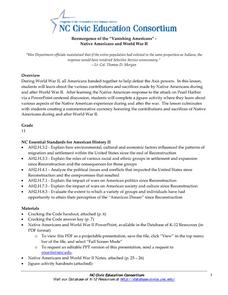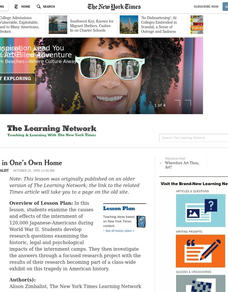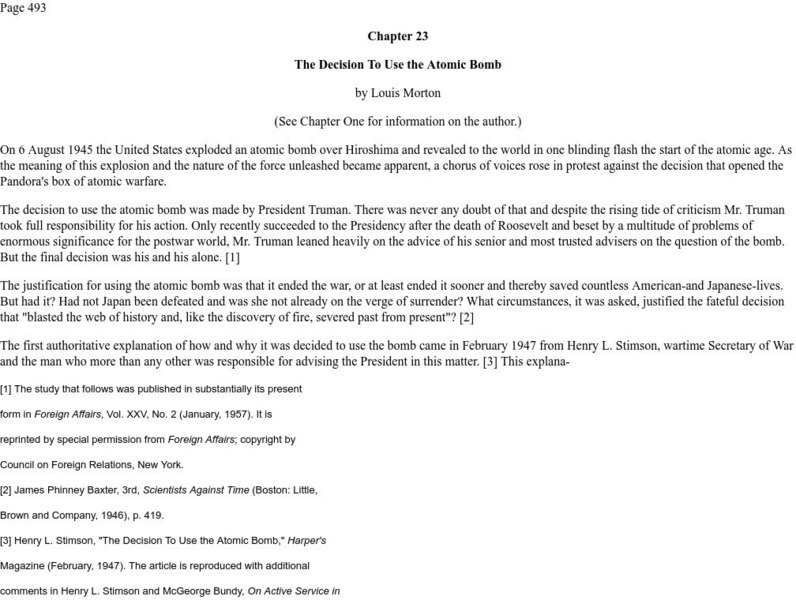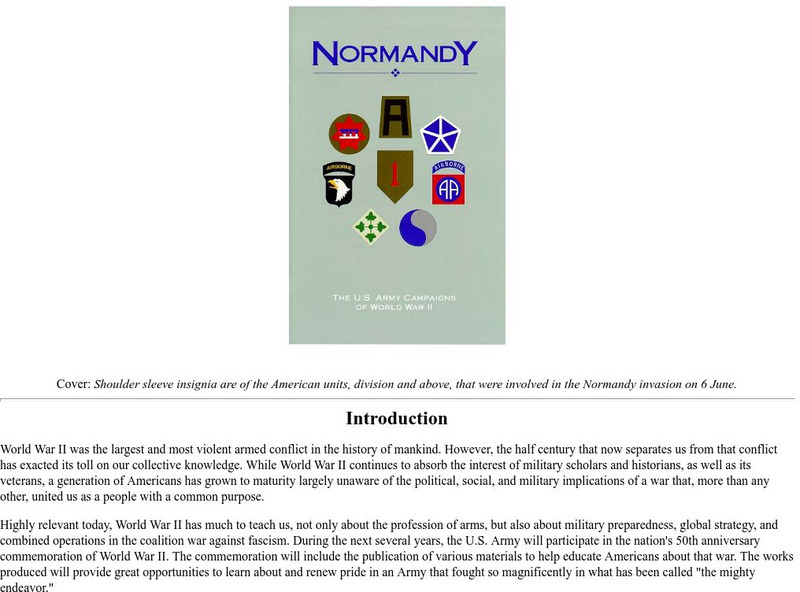Curated OER
The Dropping of the Atomic Bomb at Hiroshima and Nagasaki
Take an in-depth look at the historical events in Hiroshima and Nagasaki in this 69-slide PowerPoint. Photos, facts, and transcripts are outlined in this presentation in order to answer the stated essential question in slide 2: "What...
Carolina K-12
World War II through the Radio Waves
Young historians channel the very medium used to convey news during World War I. They create and present a five-minute radio broadcast on a particular topic from the war, such as the roles of African Americans and women, war bonds,...
Carolina K-12
Reemergence of the “Vanishing Americans” ‐ Native Americans and World War II
Discover the many contributions and sacrifices of Native Americans during World War II. After gaining background information through a detailed PowerPoint presentation and guided notes, your young historians will participate in a jigsaw...
US National Archives
The Home Front: How Did People Prepare for the War at Home?
Wars have a profound effect not only on a country's soldiers, but also on the everyday lives of its citizens. Invite young historians to discover how Britain prepared for the second World War by analyzing a series of government posters...
Curated OER
Using Primary Sources to Study the Holocaust
Engage your middle schoolers with Pastor Martin Niemoller's famous poem that begins, "First they came for the communists." Now that you have their attention, send learners to the various work stations you created to have them explore...
Curated OER
Prisoner in One's Own Home
Examine the internment of Japanese-Americans during World War II. After reading an article from the New York Times and exploring the author's word choice, young readers find the central idea in the text and work on researching additional...
Curated OER
Modern Figure Sculpture
Alberto Giacometti is a renowned sculpture, made popular by his "tall, gaunt" figures. His sculptures have been interpreted in many ways: representing isolation, Holocaust victims, or of one standing against adversity. Giacometti says...
Curated OER
Survivor Stories
Trace a survivor's story using a timeline, map skills, poetry and/or prose and photography, and make a visual representation of a survivor's journey through his or her life as a culminating activity for the class and the survivor. This...
Curated OER
The People of World War Two
Students explore how those children returning felt isolated and how shocked they were by the changes in Britain. They explain the impact that World War Two had upon the generation born during the war. Students explore how people felt...
Curated OER
Black And Asian Involvement in World War 2
Students read story excerpts from the BBC WW2 People's War archive to discover the contributions and obstacles faced by Asian and Black participants in World War 2 British forces. They prepare a radio report describing the commonwealth...
Curated OER
The Enemy that Never Was
Students write speeches explaining why Japanese Canadians were not a threat to Canada during World War 2. In this Japanese Canadians lesson plan, students learn about racism, and how the Japanese were targeted but not a threat during the...
Curated OER
Social Effects of WWII on SC
Fourth graders compare how the events in the Charleston Harbor affected South Carolinians versus people in other parts of the U.S. In this American history lesson, 4th graders watch a video clip, discuss sections of a book, and conduct...
Curated OER
Prisoner of War Camps In Germany- Crossword
For this history crossword puzzle worksheet, students read and analyze 12 clues pertaining to the prisoners of war in Germany during Word War II. Students fit their answers into a crossword puzzle, which has no word bank.
Curated OER
Primary History: Children of World War 2 Extension Activity- Daily Life
In this World War 2 learning exercise, students choose to complete one or more of the three listed extension activities. All activities pertain to daily life of children during World War 2.
Curated OER
Primary History: Children of World War 2: Growing Up In Wartime
In this history instructional activity, students first use the Internet to research and compare schools during World War 2 with those today. Students write a Christmas list of presents for a wartime child in the 1940s.
Curated OER
Writing About Pearl Harbor
Students summarize the reasons why the U.S. entered World War 2. They view a video on the bombing of Pearl harbor, construct a timeline of WWII events, and evaluate propaganda posters to create their analysis of the start of U.S....
Exploratorium
Exploratorium: Nagasaki Bombing Remembering Nagasaki
A site based on remembering Nagasaki before, during, and after the bombing. Many pictures and accounts can be accessed by clicking on the picture the page.
BBC
Bbc: 1955: West Germany Accepted Into Nato
Describes the entrance of West Germany into NATO in 1955. A turning point of post-WWII world affairs. After being responsible for so much destruction, West Germany was welcomed back into the European community.
US National Archives
Nara: Teaching With Documents: Message From Eisenhower to Marshall
This lesson takes a close look at a primary document written by General Eisenhower to General Marshall. The document reflects a lack of information about the invasion that was underway. There are activities and worksheets included.
US National Archives
Nara: Pictures of African Americans During Wwii
Captivating audiovisual look at the role African Americans played during World War II.
The History Place
The History Place:memories of the White Rose Wwii
This site has the story of an anti-Nazi resistance movement in Germany during World War 2 written by one of the participants. Includes primary documents on the trials held after their capture.
US Army Center
U.s. Army Center of Military History: The Decision to Use the Atomic Bomb
In-depth analysis of the decision to create and drop the atomic bomb on Japan during World War II. Includes details on the Interim Committee.
US Army Center
U.s. Army Center of Military History: Normandy the u.s. Army Campaigns of World War Ii
This military history essay describes the landing of the United States Army during the Normandy Invasion of June 6, 1944.
Other
Hiroshima and Nagasaki Remembered
History, archival film footage, photographs, pictures, maps, and biographies of people connected to the bombings, and related documents and resources.
























